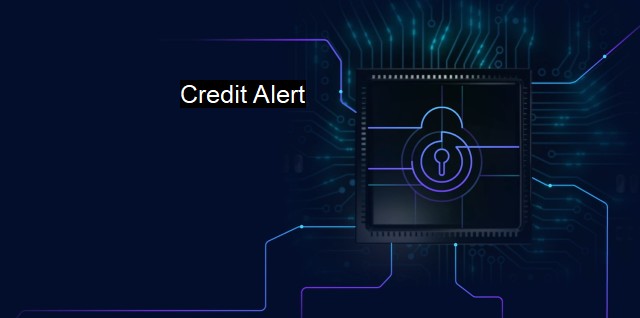What is Credit Alert?
The Importance of Credit Alert: Safeguard Your Financial and Personal Information from Cybercriminals and Fraudulent Activity in the Digital Age
Within the most encompassing confines of cybersecurity and antivirus software, the term "credit alert" retains somewhat of a unique significance. It is a critical tool or service that highlights potential threats and risks associated with credit or financial transactions, adding an extra level of protection against fraud and cybercrime. So, what exactly is a "credit alert"?A credit alert symbolizes a notification mechanism that informs a consumer, financial institution, or credit bureau about notable changes in credit activity, potential fraudulent transactions, or any unusual behavior related to one's credit profile. A credit alert can serve as a preventive cybersecurity measure to counteract identity theft, inhibit unauthorized exploitation of a credit account, and minimize personal financial loss.
In the cybersecurity context, credit alerts represent an integral part of the security strategy, especially in today's digital era, where online transactions are common, and cyber threats are pervasive. By using credit alerts, users can monitor their credit activity in real-time, enabling them to take swift action if their security has been compromised, thereby preemptively mitigating damage from potential fraud or identity theft.
For instance, if there is an attempt to create or change a credit account using your identity or misuse your credit card details, a credit alert will instantaneously notify you. As a result, you can immediately reach out to the financial institution or credit bureau to halt the suspicious activity.
It's essential to recognize that antivirus software plays a significant role in supporting these alerts. Antivirus security suites come packed with features that facilitate the safe execution of online transactions. While they directly protect against malware and other security threats, they indirectly support credit alerts by providing a secure environment for financial activities.
In addition to real-time protection against malicious software, many antivirus programs offer additional features designed for safe e-commerce, including virtual keyboards for secure password input, encrypted storage for credit card information, and protection against phishing, where cybercriminals try to unlawfully acquire personal information such as usernames, passwords, and credit card details.
The complementary operation of credit alerts and antivirus software provides layered security. Although credit alerts can prevent unauthorized transactions, they're not designed to counter cyber threats such as viruses, malware, or network intrusion. That's where the antivirus comes into play, warding off any malicious entities trying to steal your personal and financial data.
In light of rising cybercrime cases, such as identity theft and credit card scamming, the importance of employing both credit alerts and robust antivirus software cannot be overstated. By being vigilant about any changes in their financial situation via credit alerts and with antivirus protection to shield their devices and sensitive data, individuals can embark on their online activities securely.
A credit alert system and antivirus software may not be impervious, but they provide formidable defenses against identity and financial theft. Subsequently, it's on everyone responsibly dealing with the digital space to stay up-to-date and adapt to the developing facets disclosed by cybersecurity and antivirus realms to maintain their digital and financial well-being.
a credit alert is a crucial cybersecurity tool where protection against financial fraud is essential. By working hand in hand with antivirus software, it ensures better use of online banking and commerce facilities, contributing to safer financial landscapes for users worldwide. As much as cybersecurity dynamics keep shifting, credit alert systems, racked up with footprint-less antivirus software, remain an impactful antidote to financial and identity theft-related cyber threats, marking a safer pathway for the cyber-minded generation.

Credit Alert FAQs
What is a credit alert?
A credit alert is a notification that is sent by specific credit monitoring services to warn people about suspicious or unauthorized credit activities.How does a credit alert work?
A credit alert works by alerting the person when there are changes or inquiries made in their credit report. The alert can be sent through email, text message or phone call.Why is credit alert important for cybersecurity?
Credit alerts are important in cybersecurity as fraudulent activities such as identity theft can cause significant damage to one's credit score. Credit alerts help to detect and prevent these fraudulent activities on time.Do antivirus programs include credit alert features?
Some antivirus programs may offer credit alert features that can help prevent and detect identity theft. However, it is advisable to use dedicated credit monitoring services for optimal protection against credit fraud.| | A | | | B | | | C | | | D | | | E | | | F | | | G | | | H | | | I | | | J | | | K | | | L | | | M | |
| | N | | | O | | | P | | | Q | | | R | | | S | | | T | | | U | | | V | | | W | | | X | | | Y | | | Z | |
| | 1 | | | 2 | | | 3 | | | 4 | | | 7 | | | 8 | | |||||||